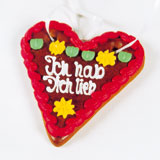Traditional Celebrations and Festivals

There are numerous traditional festivals and celebrations every year in Germany. Many have a long tradition going back hundreds of years; others have their roots in modern day culture.
In February, the predominantly Catholic areas of Germany celebrate "Karneval" (in Rhineland-Palatinate), which is also known as "Fastnacht" or "Fasching" in southern Germany. The highlight of the festivities is what is known as "Rosenmontag" when large street parades take place. Famous traditional processions are held in cities like Cologne and Mainz or in Rottweil and other southern German cities. The celebrations begin on the Thursday before Lent called "Weiberfastnacht" and go on until the following Wednesday, "Aschermittwoch". People dress in costumes with fancy masks and traditional gowns. The tradition stems from old customs to celebrate the end of winter and the start of spring. Ash Wednesday is the beginning of the Christian period of 40 days of fasting which ends on Easter Sunday.
"Kirmes", "Jahrmarkt", and "Kerb" are the names given to fairs that normally last a weekend or even a week. Carousels, roller coasters, giant wheels, haunted houses, shooting stands, numerous fast food stands and other attractions are set up on fairgrounds or town squares.
Mother’s Day is celebrated on the second Sunday in May. Mothers are given flowers and presents by their children.
Ascension Day ("Himmelfahrtstag") is also known as "Vatertag" (Father's Day) or "Herrentag" in German. Unlike Mother’s Day gifts are normally not given. Many adult men drive through the streets and woods in carts, drinking alcohol.
The 14th of February is "Valentine’s Day". Valentine’s Day is the day for lovers and is relatively new in Germany. Nevertheless, the florists look forward to greater sales.
Also in Germany, "International Women’s Day" is celebrated on the 8th of March .
The "Oktoberfest", also called the "Wiesn", which takes place in Munich every year, is Germany’s largest festival and is one of the most well known festivals throughout the world. Every year more than 6 million visitors flock to the festival. More than 5 million litres of beer are drunk and more than 200,000 pairs of pork sausages are consumed during the Oktoberfest. In addition, carousels, roller coasters and other spectacular funfair attractions can be found on the huge festival site at the foot of the “Bavaria” statue. A procession of breweries and publicans and a concert of all festival bands also forms part of the official festivities.
![]() www.oktoberfest.de
www.oktoberfest.de
These festivals are often the highlight of the year in many small towns. The members of the shooting club march through the town behind a marching band. The tradition dates back many centuries to the times when members of the shooting club protected the town from attack from outside forces.
The history of Christopher Street Day began in 1969 in New York’s Christopher Street. Here, homosexual and transsexual people defended themselves against police violence and discrimination. Today, to commemorate Christopher Street Day thousands of homosexual people parade on the streets in many cities.
![]() www.csd-deutschland.de
www.csd-deutschland.de
The "Karneval der Kulturen" (Carnival of the Cultures) has been celebrated in Berlin-Kreuzberg over the Whitsun holiday weekend since 1996. It has developed against the background of growing internationality and immigration. The highlight of the four-day street festival is the procession on Whit Sunday. In 2004, 1.5 million people celebrated in the city of Berlin. The "Karneval der Kulturen" is also held in Hamburg, Essen and Bielefeld, among others.
![]() www.karnevalderkulturen.de
www.karnevalderkulturen.de
